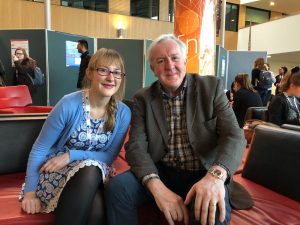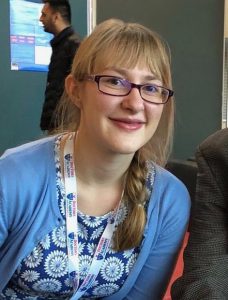During a quiet moment at the 5th HYMS National Undergraduate Surgical Conference, I was lucky to able to interview one of our brilliant speakers: Professor Derek Alderson, President of the Royal College of Surgeons. Professor Alderson had some words of wisdom on building a successful career as a surgeon.
SS: Thank you for talking to me today Professor Alderson. Can you tell me what made you first want to be a surgeon?
 DA: When I first went to medical school, I didn’t have any ambitions about any particular speciality. To be honest, at the end of my pre-clinical training, I was beginning to have second thoughts about whether I should stay in Medicine! But then we started to do clinical medicine and I really enjoyed my rotations in surgery. I decided I needed to go and get some more experience in surgery so that I could realise whether or not it was for me. The professor of surgery in Newcastle helped me do this and helped me arrange my elective in Chicago with a renowned surgeon called Dr Block. I think it was there that I really developed and started to achieve much more than I had done in Newcastle: Dr Block helped me to understand that if I truly wanted to be a surgeon, then I would have to pull my socks up and work hard rather than fooling around as I had previously. He was an inspiration to me really and spent many evenings and weekends teaching me on the wards. It was from then on that I knew my forte was going to be surgery.
DA: When I first went to medical school, I didn’t have any ambitions about any particular speciality. To be honest, at the end of my pre-clinical training, I was beginning to have second thoughts about whether I should stay in Medicine! But then we started to do clinical medicine and I really enjoyed my rotations in surgery. I decided I needed to go and get some more experience in surgery so that I could realise whether or not it was for me. The professor of surgery in Newcastle helped me do this and helped me arrange my elective in Chicago with a renowned surgeon called Dr Block. I think it was there that I really developed and started to achieve much more than I had done in Newcastle: Dr Block helped me to understand that if I truly wanted to be a surgeon, then I would have to pull my socks up and work hard rather than fooling around as I had previously. He was an inspiration to me really and spent many evenings and weekends teaching me on the wards. It was from then on that I knew my forte was going to be surgery.
SS: That sounds like a brilliant experience! What helped you pick your speciality within surgery?
DA: At the time that I was training (in the 1970s), general surgery encompassed most things, such as urology, vascular, and gastrointestinal (GI), but I found that what I enjoyed most of all was upper GI. This included stomach, oesophagus, pancreas, and liver. So much so that when I moved to Bristol for my first consultant job, I had already decided that I would purely focus on upper GI surgery, which was quite unheard of: the sub-specialism of today wasn’t as common back then. When I moved to Birmingham seventeen years later, I further specialised to gastro-oesophageal operations.
SS: What do you think are the best parts about being a surgeon?
DA: Easy question- it is without a doubt the best job in the world! It is wonderful. Of course, it is demanding, but I feel that there is so little in life that can be as rewarding as someone trusting you to operate on them and then that operation succeeding as well as both of you had hoped. Obviously, that is a simplification of surgery, because it is not the case all the time; but personally, I have still found it a fantastically rewarding career. Also, I think that now there has not been a better time to train as a surgeon, because it is such an exciting time with new innovative research happening. If I had my time again, I would definitely still choose to be a surgeon! It also gives you a platform to help patients in others ways. For example, When I was working in Birmingham, I helped my unit set up a group for our patients undergoing surgery for gastro-oesophageal cancers so they could better support each other. That group eventually became so successful that the last time I visited them, there were roughly 70-80 patients and twice as many relatives and friends all in one room!
SS: You’ve mentioned that surgery is a very demanding speciality. To succeed in the surgical field, what do you believe are some of the essential qualities?
DA: Many of the qualities needed are important for the other specialities, but I think that some are perhaps more vital than others. You do need to have a lot of resilience and stamina in order to succeed and ‘get back on your bike’ when something does not go quite right, because bad things will inevitably happen. Another thing that is essential is that you have to have the ability to be receptive to change. This is important because technology within medicine is advancing so rapidly and even when you’ve finished your training, you will continue learning. The whole process of getting into the surgical field and then succeeding is probably akin to a marathon race- it takes a long time.
SS: Lastly, do you have a top tip that you think will be useful for our budding surgeons out there?
DA: My top tip would really be to remember that the modern surgeon is a very small cog in a very large wheel or team. You must be able to work in a team, but also have the ability to step up and be a good leader of that same team.
SS: Thank you very much for talking to us today Professor Alderson.
 Samantha Strickland is a third-year medical student at HYMS. She has a keen interest in neurosurgery and research. In her spare time she enjoys listening to music, baking, eating out, spending time with family (and dog!) and swimming.
Samantha Strickland is a third-year medical student at HYMS. She has a keen interest in neurosurgery and research. In her spare time she enjoys listening to music, baking, eating out, spending time with family (and dog!) and swimming.

